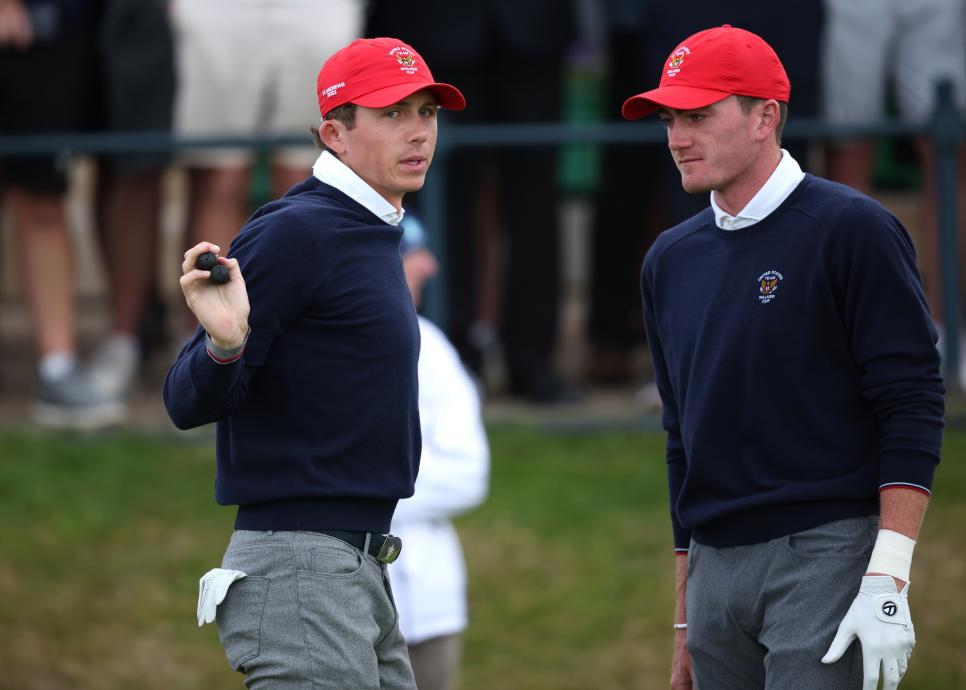When the PGA Tour announced the PGA Tour U Accelerated program in which a college player can earn his tour card by winning enough amateur tournaments and awards before his senior year, I knew I had a chance. No one is more excited about the program than I am: I’m a junior, playing college golf at Vanderbilt, but I already have my PGA Tour card. After the NCAA Championship, I can turn pro and start playing on tour.
I grew up going to the course with my dad. I’ve always been around the game but never forced into it. The drive to get better came from me, and that gave me ownership over my game. We’re members at The Country Club of Birmingham, and all summer my brother, our friends and I would get dropped off in the morning and picked up in the evening. Chipping contests would turn into wiffle ball games. The goal was to have fun.
● ● ●
I was 9 when I played the Future Masters in Dothan, Ala., where there were lots of people and everything was official. I didn’t play great that first year, but the next year I played a lot better. I vividly remember seeing the growth in my game. That’s what got me addicted to golf. I played team sports—baseball and basketball—but I loved that with golf I could see the progress clearly through my scores.
● ● ●
My friends and I saw older kids at our club play college golf, and we realized that we could do that, too. We worked harder. I stopped playing baseball and basketball in sixth grade to focus on golf. Honestly, I wish I had stuck with other sports longer. Those sports gave me a basic level of athleticism that I didn’t get from playing golf. I brought my strength and coordination from playing other sports to golf, which gave me a big advantage.
Ross Parker/R&A
I was always pretty small, so I learned how to swing hard to get as much distance as possible. I never did speed training, but swinging hard as a little kid taught me how to rotate and use the ground. During my junior year of high school, I grew a few inches and started hitting it much farther, so I worked on control. I strengthened my core, which made me stable enough to handle fast swing speeds. The coaches at Vanderbilt had been recruiting me but didn’t see me for a year because of COVID. When they saw me again, during my senior year, I had become a bomber.
● ● ●
I knew Vanderbilt was the right spot for me. Vandy is a three-hour drive from Birmingham—just far enough so that I wouldn’t have my parents knocking on my door every day. A guy I knew from Birmingham, Patrick Martin, played golf at Vanderbilt. He told me to learn how to do things on my own before college, like doing your own laundry and managing your own schedule. The less I had to figure out at college, the more headspace I would have for golf.
● ● ●
We worked on course management as a team—that’s the biggest difference between junior and college golf: To be successful in college, you must learn where to hit it off the tee, when par is a good score and which pins to avoid hunting. The 2022 NCAA Championship was at Grayhawk Golf Club in Arizona, and after 72 holes, I was tied at the top with three other guys. The first playoff hole was 18. It’s a driver hole.
I knew somebody had to step up and take it. I was nervous, but I hit my driver exactly where I wanted to. I had 140 yards in on the 520-yard hole. You can do the math. I wouldn’t have gone for the tricky pin in regulation, but I had a good number so I decided to be aggressive. When the five-footer to win fell, I didn’t process it for a few days. When I watched the video of the final putt, and I saw how happy my teammates and family were, the moment felt real.
● ● ●
About six months later, I got a call from Augusta National Golf Club. I could not believe the invitation to the Masters was real. An amateur hadn’t received a special invitation since 2000. It hurt to miss the cut, but playing the Masters and the 2023 U.S. Open allowed me to test my game against the best pros. I can hit it a long way, but distance is not as much of an advantage in the pro game. In college, you can get away with missing in the wrong spots. You can’t do that in professional golf. Playing alongside those guys, I saw that you want your rounds to look boring and methodical.
● ● ●
By creating the Accelerated program, the tour is letting us college guys know they want us out there. We were all cheering for Nick Dunlap when he won in Palm Springs. I’ve played against him and was his teammate in the Walker Cup. Seeing a guy that I’ve beaten win on tour gives me confidence and motivation to know that my first tour win is not that far away.
More from Golf Digest  cover story How To Compete: Nick Dunlap’s keys to playing your best when it matters
cover story How To Compete: Nick Dunlap’s keys to playing your best when it matters
● ● ●
The program allows me to defer turning pro. I’ve decided to stay at Vanderbilt through my senior year. Education has always been important in our family, so I want to get my degree. By staying, I get another year to develop as a player with coach Limbaugh and my teammates. I signed NIL deals with Nike and Titleist, and they both supported my decision. So, I’m staying, and we’re getting to work to win a team NCAA Championship. —with Keely Levins
RELATED: The science behind golf’s newest bomber
This article was originally published on golfdigest.com
